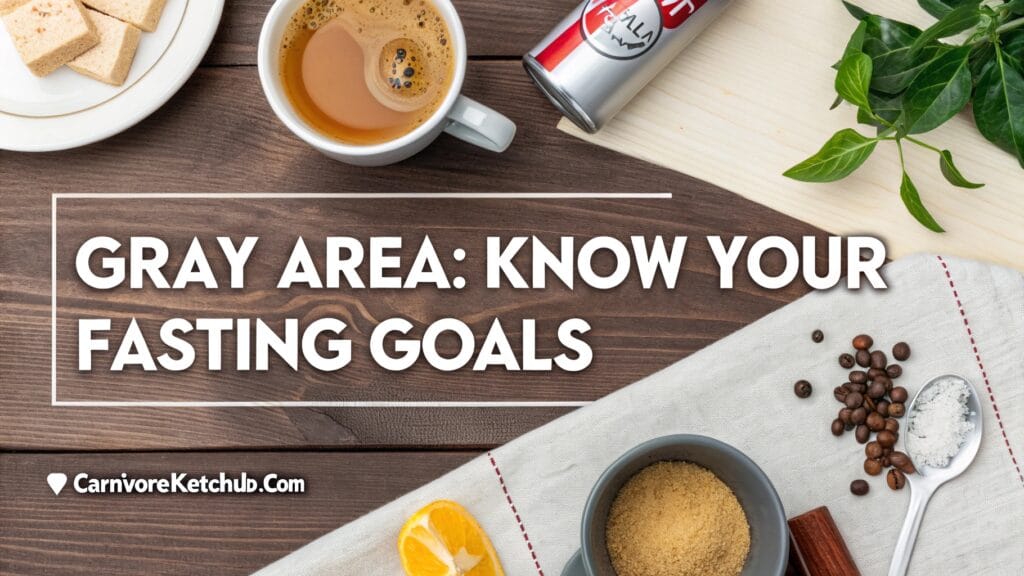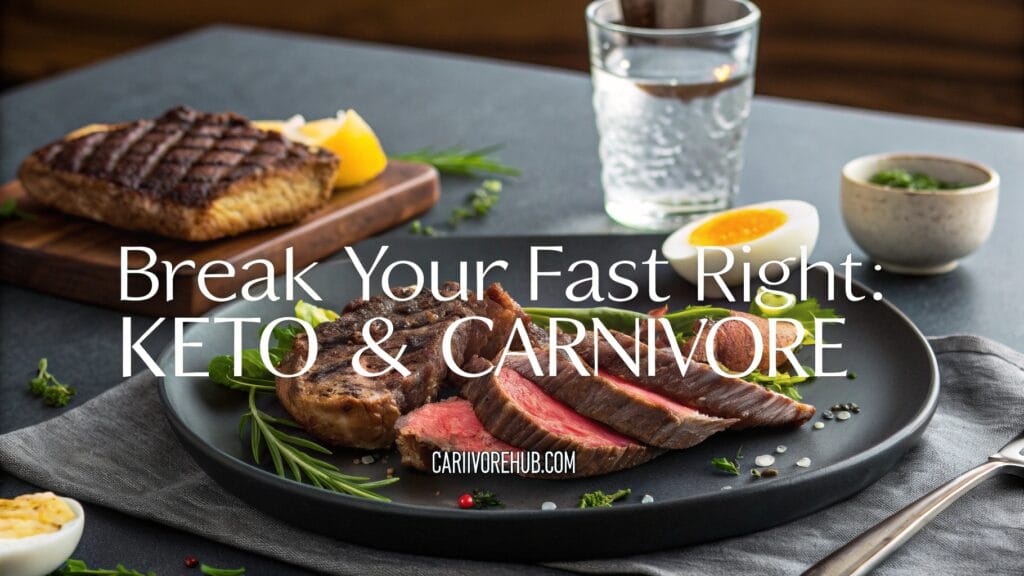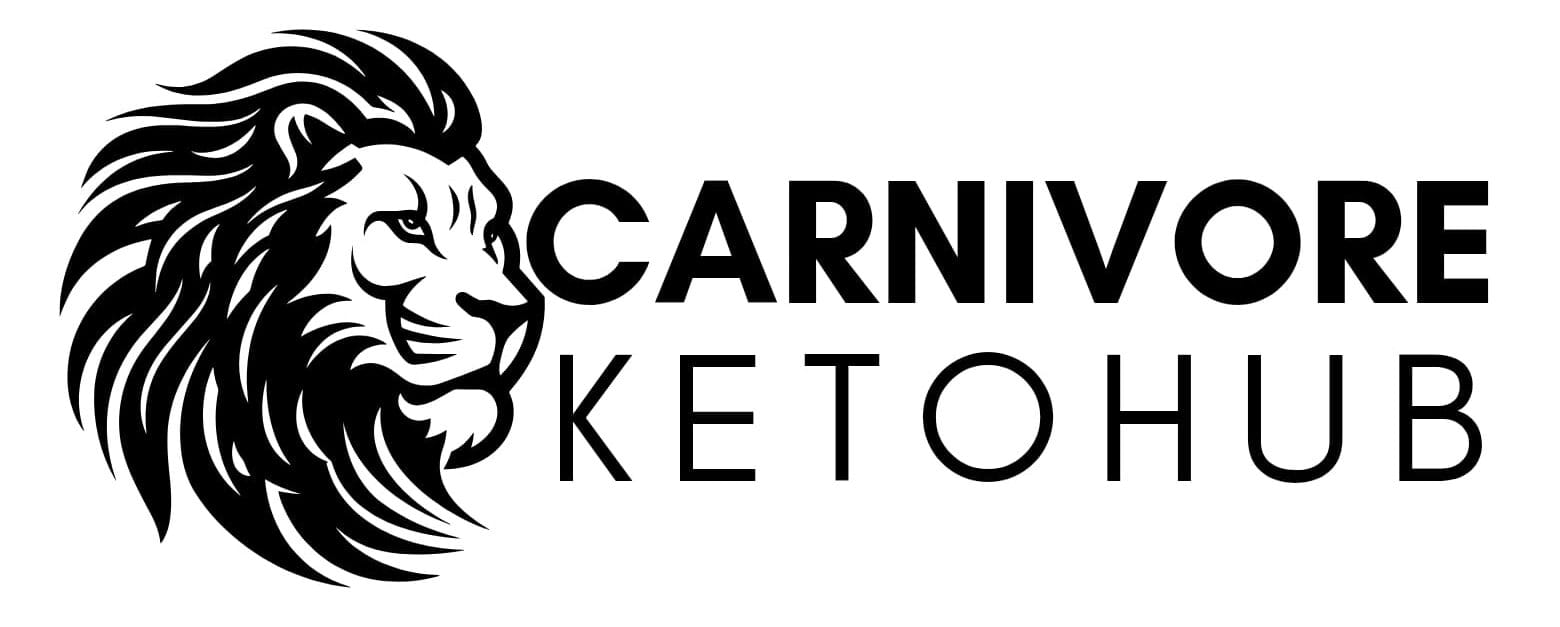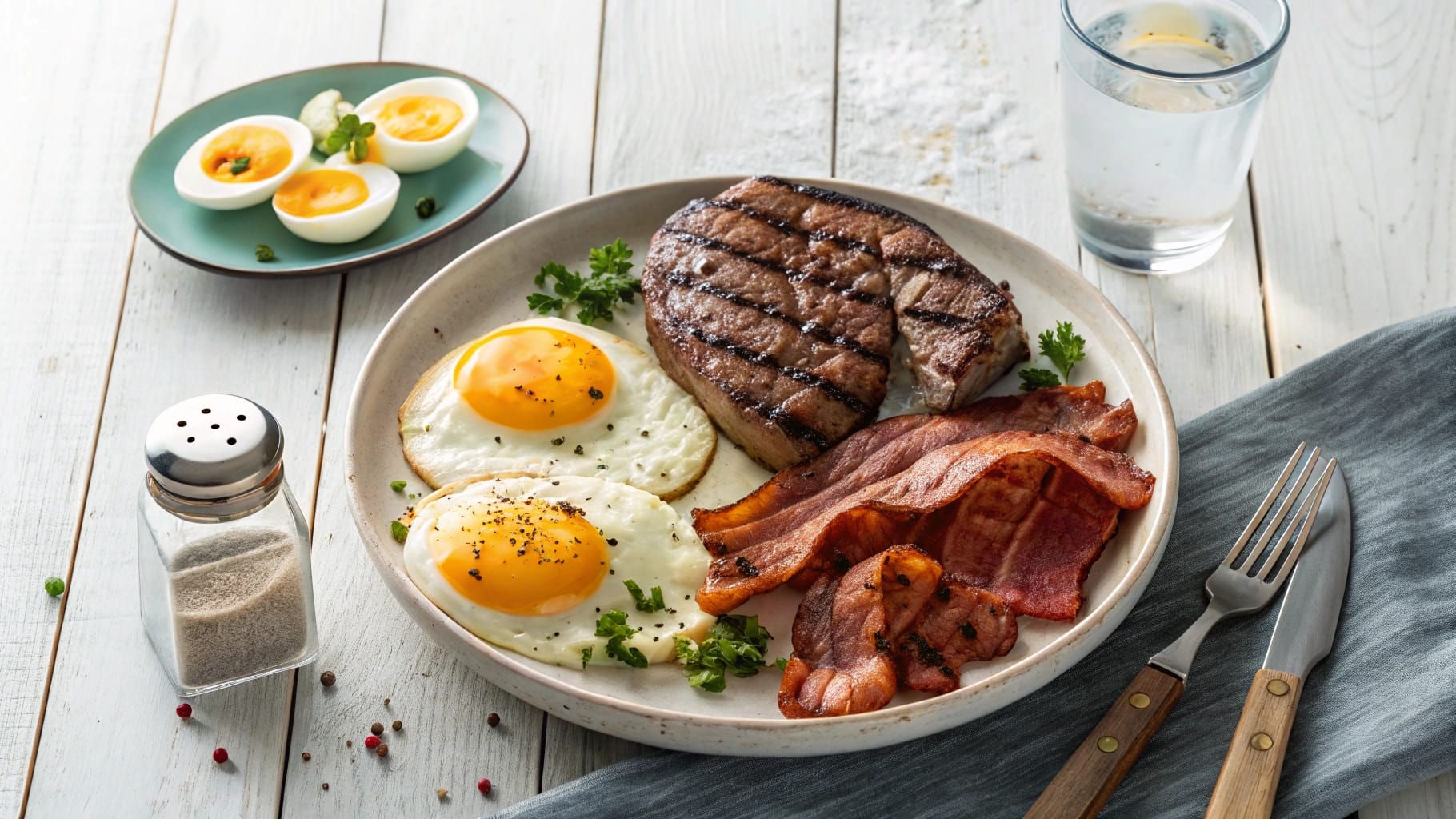What Breaks Intermittent Fasting? (The Keto & Carnivore Guide)
You’re committed to your intermittent fast, feeling good… then the question hits: “Wait, can I actually have this?” Whether it’s coffee, bone broth, or a splash of cream, knowing what breaks your fast is crucial for anyone following a keto or carnivore lifestyle.
With so much conflicting information online, it’s hard to separate fact from fiction. What’s acceptable for one person’s fasting goals might completely derail another’s, especially when insulin control is key for those on keto and carnivore diets.
This definitive guide clarifies what truly breaks an intermittent fast, specifically for keto and carnivore eaters. We’ll analyze common drinks and those “gray area” items based on calories, insulin impact, and how they align with your specific fasting goals.
Table of Contents
Understanding “Breaking a Fast”: It Depends on Your Goal
Before we dive into specific foods and drinks, it’s important to understand that the definition of “breaking a fast” isn’t one-size-fits-all. What counts as breaking your fast depends entirely on why you’re fasting in the first place.
The Strict Definition
Technically speaking, a pure fast means consuming nothing but water. This is the traditional, strictest form of fasting, where any caloric intake—even minimal—breaks your fast. This definition applies particularly when your goals include maximum cellular autophagy (your body’s cellular cleanup process) or complete gut rest.
The Metabolic/Insulin Definition (Key for Keto/Carnivore)
For many keto and carnivore dieters, the primary benefit of fasting is maintaining metabolic flexibility, enhancing fat burning, and keeping insulin levels consistently low. In this context, the definition of “breaking a fast” centers around insulin impact rather than calories alone.
According to research published in the New England Journal of Medicine, this metabolic approach can trigger numerous cellular repair processes and improve multiple biomarkers of health.
Under this definition, consumables that don’t significantly raise insulin might be considered acceptable, even if they contain minimal calories. This is why the debate around certain beverages and supplements becomes so nuanced in the low-carb community.

Your “Why” Matters Most
Your fasting goals determine what’s acceptable during your fasting window:
- Strict Autophagy/Gut Rest? Stick to water, black coffee/tea, and perhaps some salt—nothing else. Autophagy is a critical cellular cleanup process that may help reduce inflammation and support longevity.
- Fat Loss/Ketosis? You may have slightly more flexibility with fat/non-insulinogenic items. Check our keto and carnivore recipes for ideas on what to eat during your eating window.
- Making fasting easier as a beginner? Some “crutches” might be acceptable initially to help you adapt. Our carnivore diet meal ideas can help you plan satisfying meals that make fasting easier.
In this guide, we’ll primarily analyze foods and drinks based on their caloric load and potential insulin impact—the factors most relevant to keto and carnivore practitioners.
The “Safe Zone”: What Generally Does NOT Break Your Fast
Let’s start with the consumables that most experts agree won’t disrupt your fasting state, regardless of your specific goals:
Water (The Gold Standard)
Nothing beats plain water during a fast. Whether it’s flat, sparkling, or mineral water, proper hydration is essential when fasting. Many experienced fasters add a pinch of salt to their water to maintain electrolyte balance, which becomes even more important when following keto or carnivore diets.
According to research from the Journal of Clinical Investigation, proper hydration during fasting helps optimize fat metabolism and prevents common side effects like headaches and fatigue.
Pro tip: If you struggle with plain water, try mineral water with a slice of lemon or lime for variety without significantly impacting your fast. This can make your carnivore diet plan more sustainable during fasting periods.
Black Coffee (Plain)
Good news for coffee lovers: black coffee contains minimal calories (2-5 per cup) and generally doesn’t trigger a significant insulin response. Many studies even suggest coffee may enhance some of the benefits of fasting by:
- Suppressing appetite
- Slightly boosting metabolism
- Increasing fat oxidation
A 2018 study published in Cell Metabolism found that caffeine consumption may promote autophagy in multiple tissues, potentially enhancing this key benefit of fasting.
The key is keeping it black—no sugar, milk, cream, or even artificial sweeteners ideally. This aligns perfectly with the principles of a zero-carb approach during your fasting periods.
Plain Tea (Unsweetened)
Similar to black coffee, plain tea—whether it’s green, black, or herbal—contains negligible calories and doesn’t typically impact insulin levels significantly. Green tea, in particular, may offer additional benefits during a fast due to its catechin content, which some research in the American Journal of Clinical Nutrition suggests might enhance fat burning.
Tea can be a wonderful complement to your carnivore breakfast during your eating window, providing antioxidants that support overall health while maintaining ketosis.
Watch out for: Some herbal tea blends contain dried fruit pieces or licorice root, which could potentially affect blood sugar levels. Check ingredients carefully to maintain a true zero-carb approach during fasting.
Unflavored Electrolytes / Salt
Electrolyte depletion is a common issue during fasting, especially for those following keto or carnivore approaches. Supplementing with sodium, potassium, and magnesium can help prevent headaches, muscle cramps, and fatigue without breaking your fast.
According to research published in Nutrients, proper electrolyte management is essential during fasting and ketogenic diets to maintain cellular function and prevent adverse symptoms like the “keto flu.”
The key is choosing unflavored electrolytes without sugars, fillers, or calories. Simple options include:
- Pink Himalayan salt in water
- “Snake juice” (a homemade electrolyte drink)
- Unflavored electrolyte supplements designed for fasting
Maintaining proper electrolyte balance is crucial for carnivore diet success, making this addition particularly valuable for carnivore practitioners. Our comprehensive guide to carnivore diet supplements provides additional information on supporting your body during fasting periods.
The Keto/Carnivore Gray Area: Do These Break Your Fast? (It Depends!)
Now we enter the controversial territory—items that might technically break a strict fast but may be acceptable depending on your specific goals:
Coffee/Tea WITH Fat (Butter, Heavy Cream, MCT Oil – “Bulletproof Style”)
Calories: Yes, significantly. Even a tablespoon of heavy cream adds about 50 calories, while bulletproof coffee with butter and MCT oil can exceed 300 calories.
Insulin Impact: Minimal if using pure fat sources. Fat alone doesn’t typically trigger a significant insulin response. The American Journal of Clinical Nutrition confirms that dietary fat has minimal impact on insulin secretion compared to carbohydrates and protein.
Verdict for Keto/Carnivore: This definitely breaks a strict fast. Adding fat provides calories your body will use for energy instead of tapping into stored body fat. While it won’t kick you out of ketosis, it does pause true fasting benefits like autophagy.
However, some keto practitioners use this as a strategic tool for “fat fasting” or as a stepping stone to longer fasts. If your primary goal is maintaining ketosis rather than maximum autophagy or fat loss, this might be acceptable. Use cautiously and be honest about your goals.
For recipe ideas that incorporate healthy fats during your eating window, check out our keto carnivore ground beef skillet or carnivore ground beef recipes that make perfect post-fast meals.
Bone Broth
Calories: Yes (low to moderate, depending on gelatin/fat content). A cup typically contains 40-50 calories and small amounts of protein.
Insulin Impact: Generally low, but the amino acids from protein can elicit a mild insulin response. According to research in the International Journal of Molecular Sciences, certain amino acids can stimulate insulin secretion to varying degrees.
Verdict for Keto/Carnivore: Technically breaks a fast due to its calorie and protein content. However, bone broth offers valuable nutrients and electrolytes that align well with carnivore principles.
For those using fasting primarily for gut healing or nutrient density, the benefits of homemade bone broth might outweigh the drawbacks of breaking a strict fast. Many carnivore practitioners incorporate bone broth strategically during longer fasting periods.
We have excellent recipes for both beef bone broth and chicken bone broth that can be prepared during your eating window and consumed strategically. For a lighter option, try our carnivore meat stock recipe which may have less protein content.
Artificial Sweeteners & Stevia (Zero Calorie)
Calories: No.
Insulin Impact: Highly debated. While most artificial sweeteners don’t directly raise blood glucose, some studies suggest they may trigger a “cephalic phase” insulin response—essentially, your brain thinks sugar is coming and preemptively releases some insulin.
Individual responses vary significantly. A comprehensive review in Physiology & Behavior discusses how sweet taste receptors may influence metabolic responses regardless of caloric content.
Verdict for Keto/Carnivore: Best avoided during a clean fast. Beyond potential insulin effects, artificial sweeteners can:
- Trigger cravings in some individuals
- Potentially disrupt gut bacteria
- Keep your taste buds accustomed to sweetness
If your fasting goals include reset of taste preferences or maximum metabolic benefits, skip the sweeteners altogether. Instead, focus on developing a taste for nutrient-dense carnivore diet snacks during your eating window, which can help reduce cravings during fasting periods.
Diet Sodas / Zero-Calorie Energy Drinks
Contains: Artificial sweeteners, colors, acids, preservatives, and other additives.
Verdict for Keto/Carnivore: Generally not recommended during a fast (or often, even outside it). These beverages combine all the potential issues of artificial sweeteners with additional concerning ingredients that may:
- Disrupt gut health
- Potentially trigger insulin responses
- Increase cravings
- Interfere with the mental clarity benefits of fasting
Research in Trends in Endocrinology & Metabolism indicates that artificial sweeteners may alter gut microbiota and potentially affect glucose tolerance.
For clean fasting aligned with carnivore/keto principles, stick to simple liquids without additives. This approach complements the principles discussed in our carnivore diet and cholesterol article, which emphasizes clean eating for metabolic health.
Apple Cider Vinegar (ACV – Diluted in Water)
Calories/Insulin: Negligible impact at 1-2 tablespoons. Contains about 3 calories per tablespoon.
Verdict: Widely considered acceptable by many fasters. Some research in the Journal of Functional Foods suggests ACV may even have mild benefits for blood sugar control, potentially supporting your fasting goals. A tablespoon or two diluted in water is unlikely to meaningfully impact a fast.
ACV can be particularly beneficial for those transitioning between carnivore breakfast and fasting periods, as it may help maintain steady blood sugar levels. Many carnivore practitioners include ACV in their routine to support digestion of nutrient-dense animal foods.
Lemon/Lime Juice (Small Squeeze in Water)
Calories/Insulin: A small squeeze (teaspoon) contains about 1 calorie and minimal carbs.
Verdict: Generally considered acceptable in very small amounts. The flavor can make water consumption easier, potentially improving fasting adherence with minimal metabolic impact.
Gums & Mints (Even Sugar-Free)
Contains: Sweeteners, sugar alcohols, artificial flavors, and fillers. The chewing action itself can stimulate digestive processes.
Verdict: Best avoided during a fast. Beyond the potential insulin impact of sweeteners, the act of chewing signals your digestive system to prepare for food, potentially undermining some fasting benefits.

Definitely Breaks Your Fast: The No-Go List
These items definitively break a fast by any definition and should be avoided during your fasting window:
- Any solid food (meat, eggs, cheese, etc.)
- Milk, creamers (contain lactose sugar and protein)
- Sugar, honey, syrups, agave (immediate insulin spike)
- Fruit juice, vegetable juice (concentrated sugar/carbs)
- Regular sodas, sweetened teas/coffees (sugar load)
- Protein powders, BCAAs, collagen peptides (contain amino acids that trigger insulin)
- Most supplements (particularly gummies, capsules with fillers, or anything requiring food for absorption)
- Alcohol (not recommended during fasting or generally on strict carnivore)
A study in Cell Metabolism confirms that consumption of any calories during fasting periods significantly reduces many of the metabolic benefits associated with time-restricted eating.
For carnivore and keto dieters, even small amounts of these items can disrupt ketosis, spike insulin, and reset the fasting clock. Save these foods for your eating window, when you can enjoy nutrient-dense options like carnivore swedish meatballs or keto carnivore pork chops.
Conclusion: Fast Cleanly for Best Keto/Carnivore Results
For optimal fasting benefits—especially fat burning and insulin control—when following keto or carnivore approaches, your best strategy is keeping it simple. Stick to water, black coffee or tea, and clean electrolytes during your fasting window.
The International Journal of Obesity confirms that clean fasting produces superior metabolic benefits compared to modified fasting approaches. This is particularly relevant for those following a carnivore diet for brain health and cognitive clarity.
Remember that the quality of your fast matters as much as the duration. A clean 16-hour fast likely offers more benefits than a 20-hour fast filled with “maybe” items that potentially trigger insulin.
Be mindful of why you’re fasting in the first place. If autophagy and maximum cellular benefits are your goals, err on the side of caution and keep your fast as clean as possible. If you’re using fasting primarily for weight management or to make your keto/carnivore lifestyle more sustainable, you might have slightly more flexibility.
Most importantly, avoid becoming dependent on “crutches” like fatty coffee or sweetened drinks during your fasting window. The true power of intermittent fasting comes from training your body to thrive during periods without food, not from finding clever workarounds.
What drink or food are YOU most confused about during fasting? Ask in the comments below!
Need a clean electrolyte source for your fast that works perfectly with carnivore and keto approaches? Check out our guide to carnivore diet electrolytes to learn more about this crucial aspect of fasting success.

For those concerned about cholesterol levels while practicing intermittent fasting on a carnivore diet, our article on high LDL and longevity provides valuable context that may ease your mind.
Save this guide on Pinterest so you always know what’s safe during your fast!
[Download our ‘Fasting Allowed’ Cheat Sheet PDF to keep these guidelines handy!]
Want to maximize your results? Learn how to break your fast with nutrient-dense meals by exploring our collections of carnivore diet recipes and bone marrow recipes that perfectly complement an intermittent fasting lifestyle.
Enjoy, Review – We Value Your Opinion!
There are no reviews yet. Be the first one to write one.

